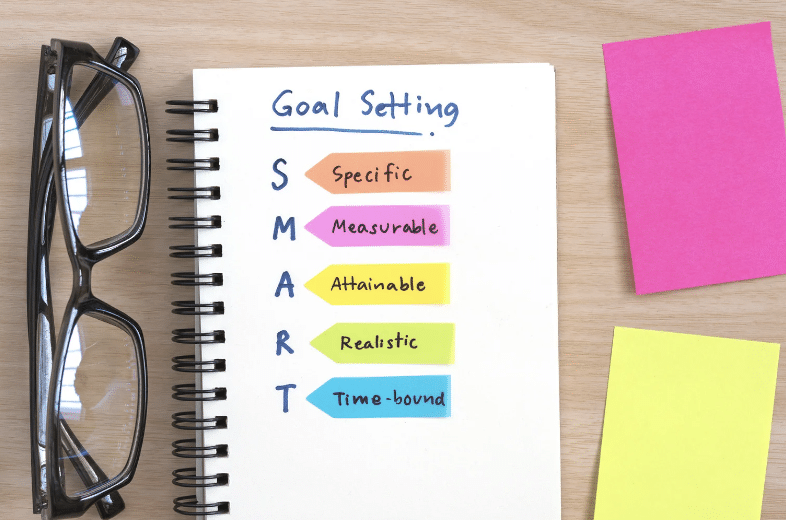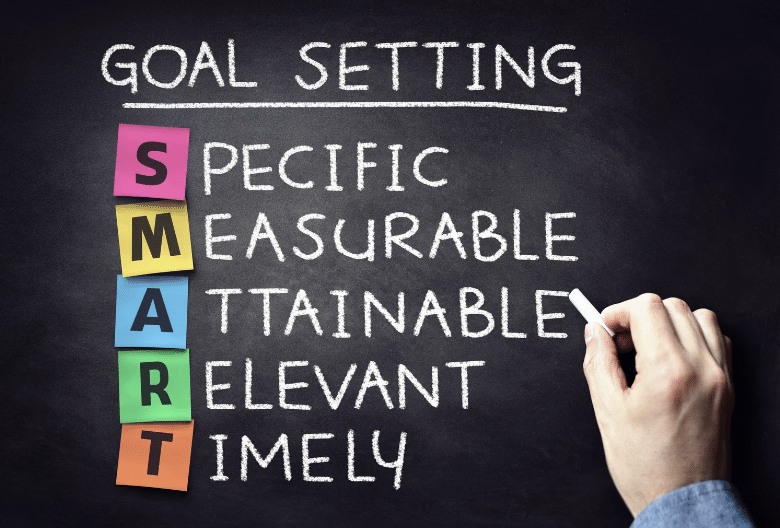Every new goal starts with good intentions: eat better, move more, stress less. But without direction, these goals can feel vague or overwhelming, leading many people to lose steam before they see results.
That’s where SMART goals come in. Health coaches know that when clients set Specific, Measurable, Achievable, Relevant, and Time-bound goals, change becomes more manageable, sustainable, and rewarding.
Whether you’re a coach guiding clients or someone seeking clarity in your own wellness journey, this powerful framework can help turn broad aspirations into real progress.

Why SMART Goals Work
SMART goals provide structure and accountability. They take big-picture desires like “I want to feel better” and turn them into clear, concrete action steps.
For clients, SMART goals help:
- Stay on track with a set timeline
- Cut through the overwhelm
- Stay motivated with measurable wins
- Build confidence with achievable steps
- Align goals with values and life priorities

For coaches, they offer a tool to co-create goals that are client-centered and forward-moving while reinforcing autonomy and self-efficacy.
What SMART Stands For
The SMART framework dates back to a 1981 article by George Doran, Arthur Miller, and James Cunningham that introduced a new method for writing clear objectives. Today, it’s a staple in coaching and goal-setting.
- Specific – Focus on one clearly defined outcome
Example: Instead of “I want to be healthier,” try “I want to walk 30 minutes after lunch on weekdays.” - Measurable – Include metrics to track progress
Example: Log daily steps or journal after each session. - Achievable – Choose goals that feel doable, not overwhelming
Example: Starting with 10 minutes a day might be more realistic than an hour-long routine. - Relevant – Make sure the goal supports the client’s overall vision of well-being
Example: If reducing stress is the priority, mindfulness may be more aligned than running a marathon. - Time-bound – Set a deadline or timeline to stay focused
Example: “I’ll try this for 4 weeks and reassess.”

SMART Goal Example: Mindfulness Practice
Here’s what it looks like in action:
Client Goal: “I want to feel less stressed and more present.”
SMART Goal: Enhancing Mindfulness in Daily Life
- Specific: I’ll meditate for 10 minutes each morning using a guided app.
- Measurable: I’ll keep a journal to note how long I meditated, how I felt, and any challenges.
- Achievable: Ten minutes fits into my morning routine without adding stress.
- Relevant: This supports my larger goal of managing stress and improving emotional health.
- Time-bound: I’ll commit to this for the next 30 days and evaluate my progress.
End Goal: Build a sustainable mindfulness habit that supports calm, focus, and emotional bala
Health Coaches and SMART Goals

SMART goals are more than a productivity tool. They are a coaching superpower. By helping clients define success on their own terms and set realistic, aligned goals, health coaches foster autonomy, resilience, and long-term behavior change.
Whether the goal is better sleep, less screen time, or consistent meal planning, the SMART framework provides the structure to make it stick.
Want More Coaching Tools?
Want More Coaching Tools?
SMART goals are just one of many powerful strategies used by FMCA-trained health coaches. Want to learn how to support sustainable lifestyle change through positive psychology, root-cause health principles, and evidence-based coaching?

Our Latest Blogs
-

Would You Be a Good Health Coach?
Read Full Article: Would You Be a Good Health Coach? -

Food Sensitivity Testing 101: Supporting Clients with Inflammation and Gut Issues
Read Full Article: Food Sensitivity Testing 101: Supporting Clients with Inflammation and Gut Issues -

Protein 101: The Health Coach’s Guide
Read Full Article: Protein 101: The Health Coach’s Guide

